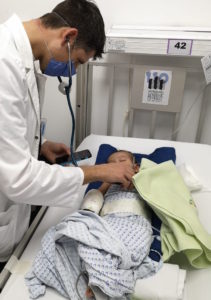
MSIH Student: Tales from a Mexican Operating Room
MSIH Student: Tales from a Mexican Operating Room
June 11, 2019
The following is an excerpt by Aaron Hochman-Zimmerman, a fourth-year student at Ben-Gurion University’s Medical School for International Health, who spent his global health rotation in Mexico City.
Global Health Experience
What was I really looking for anyway? Mostly I was looking to see where I would fit in all of this. The stated mission was in so many words: “Have a global health experience,” but we each have our own definition of global health, or at least our global health priorities.
Was I there to get into the details of it and pick up a few clever diagnostic tips long forgotten by high-tech medicine? Sure. Was I there to appreciate, in broad strokes, how a low- or middle-income country manages its medical resources? Of course. Was I there to share with them what I’ve learned in the countries where I’ve visited? I probably should.
It’s difficult to answer and should take some careful consideration to process what you’re seeing and doing, but the Mexican doctors and students I met were happy to help. And that was when I finally noticed what I was meant to find. They were happy. They didn’t seem to use their frustration and exhaustion at work as a measure of their achievement the way Americans sometimes do.
Good Spirits
One day I had to ask a neurosurgeon, who had worked in the States for several years, how surgeons in Mexico could be in such good spirits all the time. The camaraderie in the department was different than what I was used to. In the operating theater they played music, they joked and the residents felt free to ask questions without fearing reprisals.
Another of the neurosurgeons overheard our conversation and asked how it was different in the States. The first surgeon answered him by saying that the operating room in the States was “como una iglesia,” (like a church). There is no joking, no music, always serious and stern.
“It’s just our personality,” he told me. “In Colombia and Brazil, they think Mexicans are serious,” he added.
I had witnessed some more intense moments when the chatting stopped for a moment, but they seemed to be organic to the situation at hand.
In the end, I had a great time. The city itself is an exciting place to be and I did, naturally, learn a few medical tricks as well. But I saw an attitude that sometimes eludes Western medicine and shouldn’t. I’m waiting for someone to show me evidence of medical staff martyrdom improving patient outcomes. Is there any rule that says being happy is a sign of giving less than 100 percent or that smiling is disrespectful to the craft or the patients?




